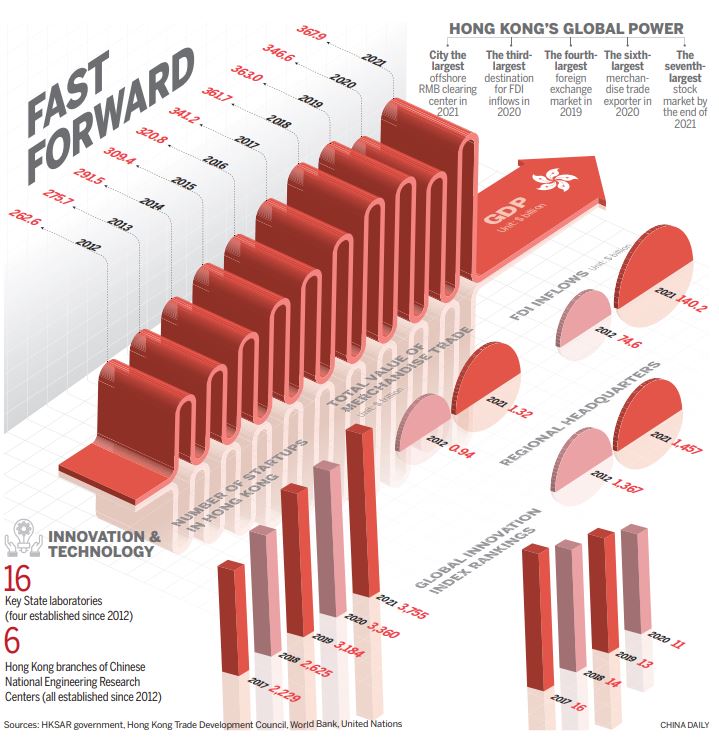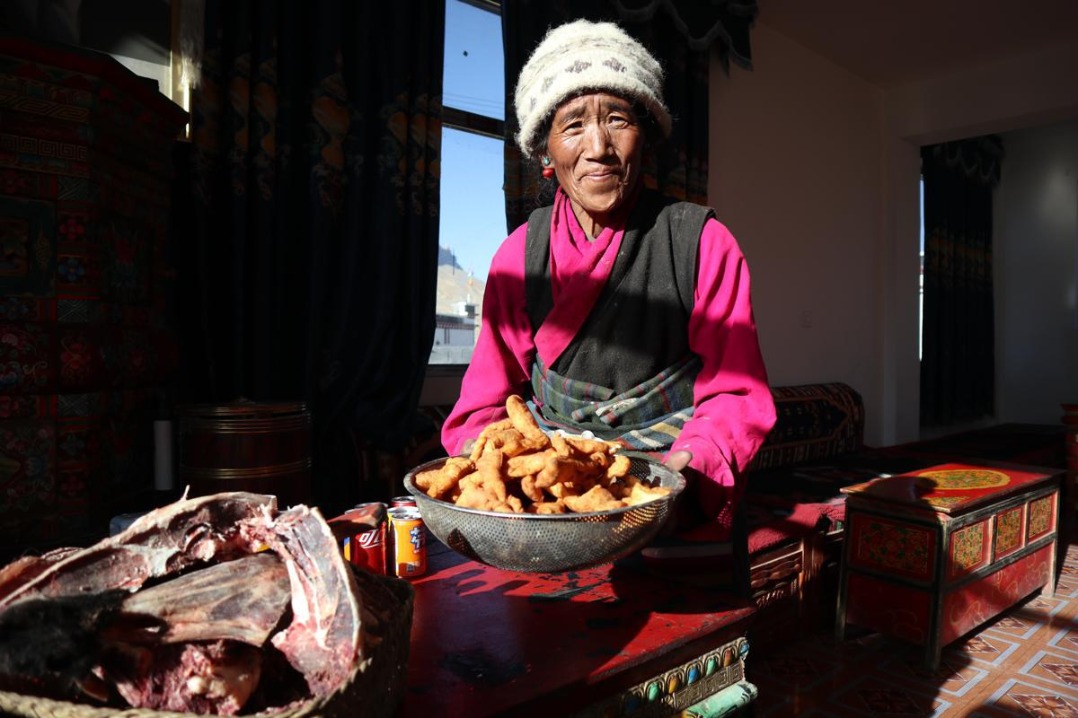HK marches ahead with prosperity and stability


Pat on shoulder
In 2017, to mark the 20th anniversary of Hong Kong's return to the motherland, Xi visited the city for three days, meeting with young Junior Police Call members at their center at Yuen Long. The meeting prompted 22 members of the group to send Xi a handmade new year greetings card, to which Xi replied in February 2018, encouraging the young people to serve the city and the country with their actions.
The pat on the shoulder for these young people served as inspiration. Kwok Wang-hei, who was 11 at the time, still remembers the warmth of Xi's smile and his firm handshake.
Following Xi's advice to broaden his horizons, Kwok applied for study tours to Sichuan, where he was surprised by the rapid development in the province, including its high-technology, e-payments and high-speed railways.
Eric Kuo Wai-keung also set about meeting Xi's expectations for young people by traveling to neighboring Shenzhen, Guangdong province, in 2017 to find engineers for smart suitcase products he had developed.
He incubated his startup in the city's Qianhai Pilot Free Trade Zone.
In Hong Kong, Kuo founded his company R-Guardian, later expanding its product portfolio to smart items such as handbags, backpacks, umbrellas and a tracking watch to locate missing children and the elderly.
Five years on, Kuo is convinced he made the right call, as his company has received three rounds of financing totaling more than 20 million yuan ($2.98 million). It is now valued at over 100 million yuan.
Kuo's dazzling success stems from the right call to orchestrate the roles of cities in the Guangdong-Hong Kong-Macao Greater Bay Area, or GBA, into a closely-knit team.
His achievements are also testimony to the synergy among GBA cities. After coming up with the idea for his company's flagship product-a smart suitcase with global tracking and digital lock-Kuo completed the research and development for it in Hong Kong.
However, Hong Kong lacked experienced engineers to realize this project, bringing Shenzhen into play. The prototype for the suitcase was developed in Guangzhou, capital of Guangdong, after the engineers in Shenzhen completed their work.
Teams in the Guangdong cities of Dongguan and Huizhou then took over, with Dongguan responsible for electrical work and Huizhou acting as production base for the project. Marketing and sales are carried out in Hong Kong.
Kuo said: "This is a full industrial chain, with nothing being done by one city alone. It is teamwork."
Another key ingredient of Kuo's recipe for success is the all-around support he has received from the central authorities and Shenzhen government.
In addition to an apartment and a rebate for renting an office, Kuo has received seed funding of 2 million to 3 million yuan over the past five years.
In the past two years, young people in Hong Kong have enjoyed equal rights regarding social security, Kuo said. Young entrepreneurs from the city and Macao can also take out loans for startups without their credit being checked, with the Shenzhen authorities simply referring to the applicants' Hong Kong and Macao identity cards.
"The message I have gained from my endeavors on the mainland is that the nation has counted Hong Kong in all along," Kuo said, adding that young people from the city can give full play to their strengths by aligning their careers with the Greater Bay Area or the nation's 14th Five-Year Plan (2021-25).
"It's like playing in a soccer match. Everyone has their roles in the team, but you have to move around and cooperate with your teammates. Waiting for the ball to be passed to you is not going to give you the chance to score," Kuo said.
"The game is not over and we still have much to offer."
New chapter
With the implementation of the National Security Law for Hong Kong, and the successful election of a new chief executive, Hong Kong is poised to move forward and usher in a new chapter.
Kuo said a stable business environment is crucial to an entrepreneur, which is why the economy and livelihoods in Hong Kong have improved since the National Security Law for Hong Kong was introduced.
Since this law took effect on June 30, 2020, the total number of arson, criminal damage, and wounding and serious assault cases has fallen from 6,118 in the first half of 2020 to 5,350 in the second half of that year and 4,886 in the second half of last year, according to Hong Kong police.
Funds raised on the city's stock market rose from HK$137.2 billion ($17.5 billion) in the second quarter of 2020 to HK$246.8 billion the following quarter.
Meanwhile, inbound direct investment flowed into the city following the implementation of the National Security Law for Hong Kong. In 2020, this investment reached HK$134.7 billion, up from HK$73.7 billion in 2019, when street violence hit Hong Kong.
Kuo is now in the fifth year of a quest to fulfill his business dream in the GBA. For Sze, the school principal, it is more than 10 years since he began his ongoing mission to bring the right knowledge and the nation's values to Hong Kong's younger generation.
The city, as it celebrates the 25th anniversary of its return to the motherland, is charting its course for the future and ensuring that the practice of the "one country, two systems" principle remains on the right track.
























